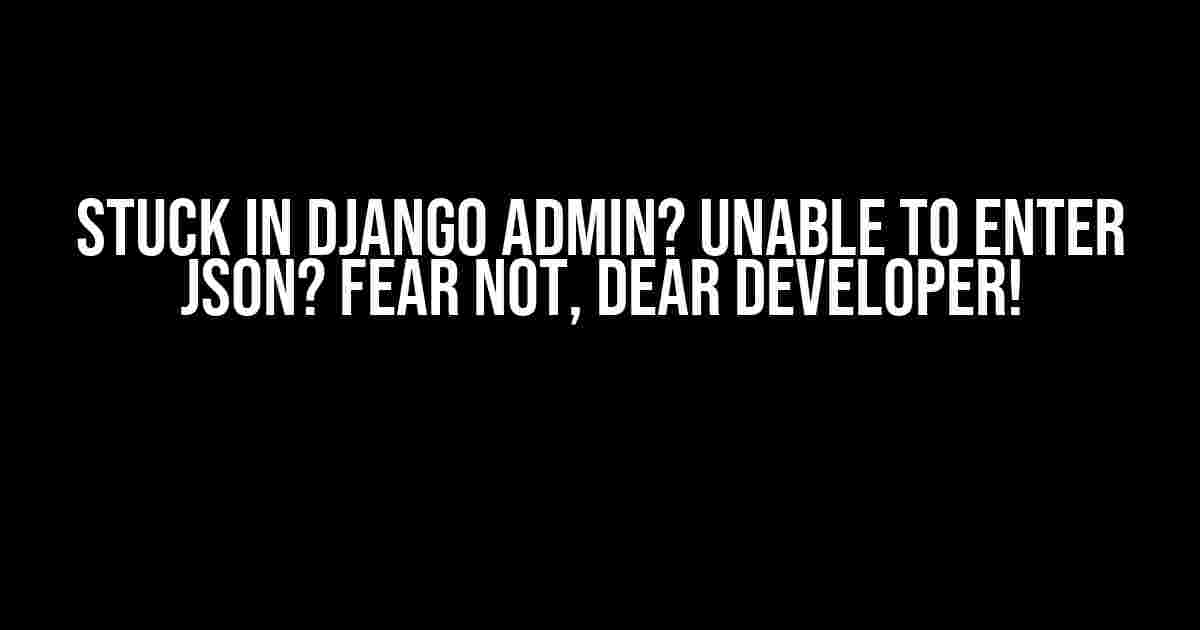As a Django enthusiast, you’ve probably stumbled upon the frustration of being unable to enter JSON data in the admin panel. It’s like hitting a roadblock on your development journey. Fear not, dear developer! We’ve got you covered. In this comprehensive guide, we’ll walk you through the troubleshooting process, provide clear explanations, and offer practical solutions to get you back on track.
Understanding the Issue
Before we dive into solutions, let’s take a step back and understand the problem. When you’re unable to enter JSON data in Django admin, it’s usually due to one of the following reasons:
- Invalid JSON format: You might be trying to enter JSON data that’s not properly formatted, causing the admin panel to reject it.
- Missing or incorrect JSON encoder: Django requires a specific JSON encoder to handle JSON data. If this encoder is missing or incorrect, you won’t be able to enter JSON data.
- Serializer issues: The serializer responsible for handling JSON data might be misconfigured or missing, leading to the issue.
- Model field limitations: Certain model fields might not be designed to handle JSON data, causing the issue.
Troubleshooting Steps
Now that we’ve identified the potential causes, let’s go through the troubleshooting steps to resolve the issue:
- Check your JSON format: Ensure that the JSON data you’re trying to enter is properly formatted. You can use online tools or validators to check the format.
- Verify your JSON encoder: Make sure you have the correct JSON encoder installed and configured. You can use the built-in
django.core.serializers.jsonencoder or a third-party library likedjango-json-widget. - Review your serializer: Check that your serializer is correctly configured and handling JSON data as expected. You can use the
serializers.ModelSerializerorserializers.Serializerclasses to define your serializer. - Inspect your model fields: Verify that the model fields you’re trying to enter JSON data into are capable of handling JSON data. You might need to use a specific field type, such as
JSONField, to store JSON data.
Practical Solutions
Now that we’ve gone through the troubleshooting steps, let’s provide some practical solutions to get you unstuck:
Using the Built-in JSON Encoder
To use the built-in JSON encoder, simply add the following code to your serializer:
from django.core.serializers.json import DjangoJSONEncoder
class MySerializer(serializers.ModelSerializer):
class Meta:
model = MyModel
fields = ['json_field']
json_encoder = DjangoJSONEncoder
Using a Third-Party JSON Encoder
If you want to use a third-party JSON encoder, such as django-json-widget, install it using pip:
pip install django-json-widget
Then, add the following code to your serializer:
from django_json_widget.widgets import JSONEditorWidget
class MySerializer(serializers.ModelSerializer):
class Meta:
model = MyModel
fields = ['json_field']
widgets = {
'json_field': JSONEditorWidget
}
Defining a Custom Serializer
If you need more control over the serialization process, you can define a custom serializer:
class MySerializer(serializers.Serializer):
json_field = serializers.CharField(widget=JSONEditorWidget)
def create(self, validated_data):
# Implement your custom creation logic here
pass
def update(self, instance, validated_data):
# Implement your custom update logic here
pass
Using a JSONField in Your Model
To store JSON data in your model, you can use a JSONField:
from django.db.models import JSONField
class MyModel(models.Model):
json_field = JSONField(default=dict)
Conclusion
And there you have it, folks! With these troubleshooting steps and practical solutions, you should be able to enter JSON data in Django admin without any hiccups. Remember to always validate your JSON data, verify your JSON encoder, review your serializer, and inspect your model fields. By following these best practices, you’ll be well on your way to becoming a Django master.
| Solution | Benefit |
|---|---|
| Using the built-in JSON encoder | Easy to implement and built-in |
| Using a third-party JSON encoder | Provides more features and customization options |
| Defining a custom serializer | Offers complete control over the serialization process |
| Using a JSONField in your model | Allows for efficient storage and query of JSON data |
So, the next time you’re stuck unable to enter JSON data in Django admin, don’t panic! Follow this comprehensive guide, and you’ll be up and running in no time.
Frequently Asked Question
Stuck with entering JSON data in Django admin? Don’t worry, we’ve got you covered! Here are some frequently asked questions and their answers to help you troubleshoot and resolve the issue.
Why can’t I enter JSON data in Django admin?
By default, Django admin doesn’t support entering JSON data directly. However, you can use a JSONField in your model and a JSONWidget in your admin form to enable JSON editing.
How do I add a JSONField to my model?
You can add a JSONField to your model by importing it from django.contrib.postgres.fields and adding it to your model definition. For example: `my_field = JSONField(default=dict)`. Don’t forget to run makemigrations and migrate after making changes to your model!
What is a JSONWidget, and how do I use it?
A JSONWidget is a custom form widget that allows you to enter and display JSON data in a readable format. You can use it in your admin form by specifying the widget in the form definition. For example: `formfield_overrides = {JSONField: {‘widget’: JSONWidget}}`.
How do I validate JSON data in Django admin?
You can validate JSON data in Django admin by defining a clean method in your form or model. For example, you can use the `json` module to validate the JSON data and raise a `ValidationError` if it’s invalid.
Can I use a third-party library to handle JSON data in Django admin?
Yes, there are several third-party libraries available that can help you handle JSON data in Django admin, such as `django-json-widget` and `django- jsoneditor`. These libraries provide custom form widgets and editors that make it easy to work with JSON data.
